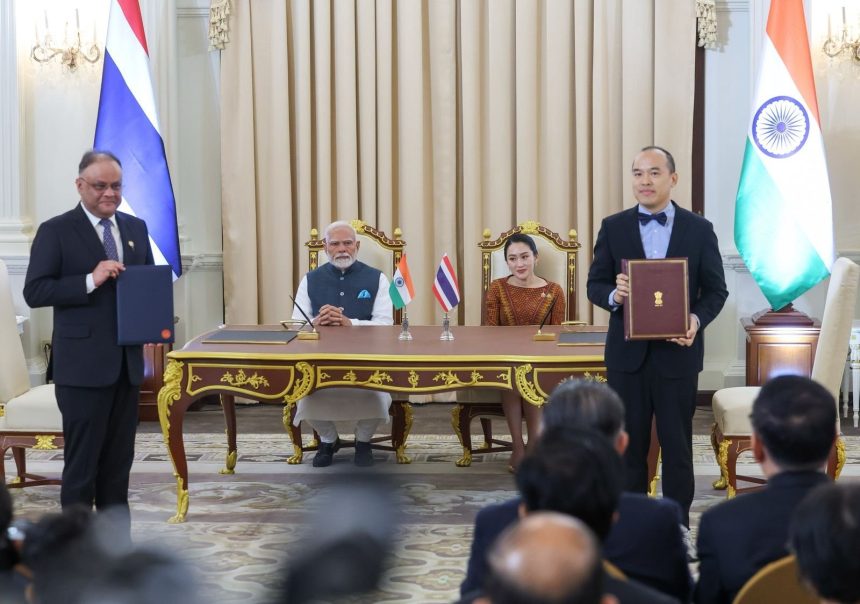In a landmark move to bolster regional cooperation, India and Thailand have officially elevated their bilateral relations to a Strategic Partnership. This significant development was announced following comprehensive discussions between India’s Prime Minister Narendra Modi and Thailand’s Prime Minister Paetongtarn Shinawatra at Bangkok’s Government House.
The dialogue between the two leaders encompassed a broad spectrum of collaborative areas, culminating in the signing of six pivotal agreements aimed at infusing renewed energy into the enduring friendship between the nations. These agreements include a Joint Declaration on the establishment of the India-Thailand Strategic Partnership and several Memorandums of Understanding (MoUs) focusing on:
- Digital Technologies: An MoU between Thailand’s Ministry of Digital Economy and Society and India’s Ministry of Electronics and Information Technology to enhance cooperation in digital technologies.
- Maritime Heritage: An agreement between India’s Sagarmala Division of the Ministry of Ports, Shipping and Waterways and Thailand’s Fine Arts Department for the development of the National Maritime Heritage Complex at Lothal, Gujarat.
- Micro, Small, and Medium Enterprises (MSMEs): A collaboration between India’s National Small Industries Corporation Ltd. and Thailand’s Office of Small and Medium Enterprises Promotion to support MSMEs.
- Cultural and Regional Development: MoUs between India’s Ministry of Development of North Eastern Region and Thailand’s Ministry of Foreign Affairs, and between India’s North Eastern Handicrafts and Handlooms Development Corporation Limited and Thailand’s Creative Economy Agency, aiming to foster cooperation in handlooms, handicrafts, and regional development.
Prime Minister Modi emphasized the synergy between India’s ‘Act East’ policy and Thailand’s ‘Act West’ approach, highlighting their potential to unlock numerous opportunities for bilateral cooperation. He underscored the focus on enhancing ties in tourism, culture, and education, particularly between Thailand and India’s northeastern states. The leaders also deliberated on expanding mutual trade, investment, and business exchanges, with specific agreements to promote collaboration in MSMEs, handlooms, and handicrafts.
The discussions extended to strengthening cooperation in renewable energy, digital technology, electric vehicles, robotics, space exploration, biotechnology, and startups. Both nations expressed a commitment to enhancing physical connectivity and advancing FinTech connectivity.
Our talks focused on ways to deepen the India-Thailand Strategic Partnership. The sectors we discussed include strategic areas such as defence, security, maritime safety and hydrography. We also reiterated our commitment to working together to overcome the challenges of… pic.twitter.com/JhRPpPwyZB
— Narendra Modi (@narendramodi) April 3, 2025
Addressing strategic concerns, Prime Minister Modi stated that the talks focused on deepening the India-Thailand Strategic Partnership in critical areas such as defense, security, maritime safety, and hydrography. Both leaders reiterated their dedication to jointly tackling challenges like terrorism and money laundering.
In light of a recent earthquake, Prime Minister Modi conveyed solidarity with the people of Thailand, reaffirming India’s support for ASEAN unity and centrality. He highlighted that both countries advocate for a free, open, inclusive, and rules-based order in the Indo-Pacific region, adhering to a policy of development rather than expansionism.
This strategic partnership marks a new chapter in India-Thailand relations, reflecting a shared vision for regional stability and prosperity.




